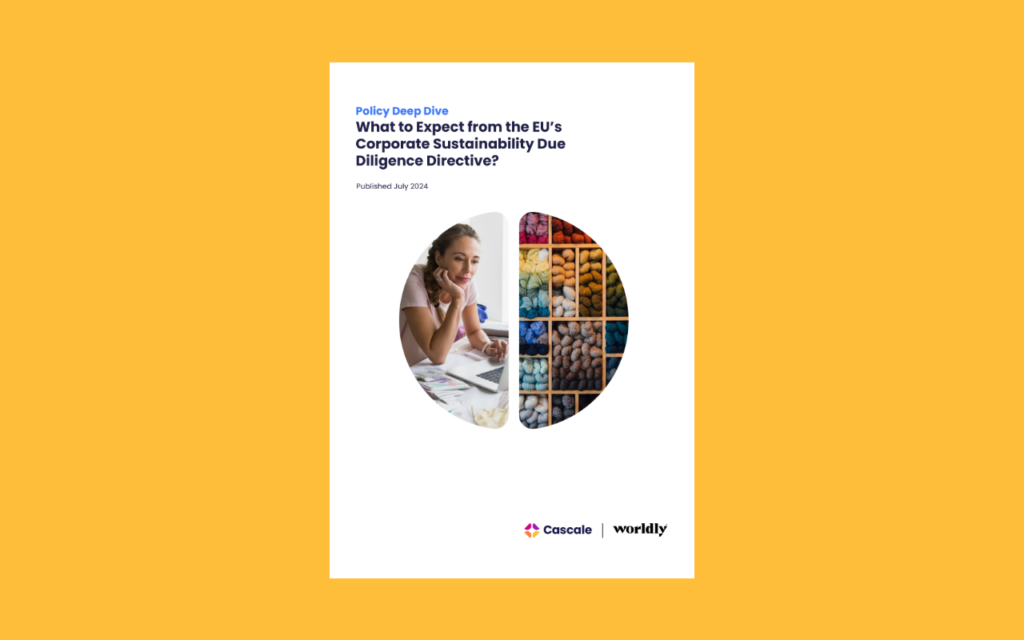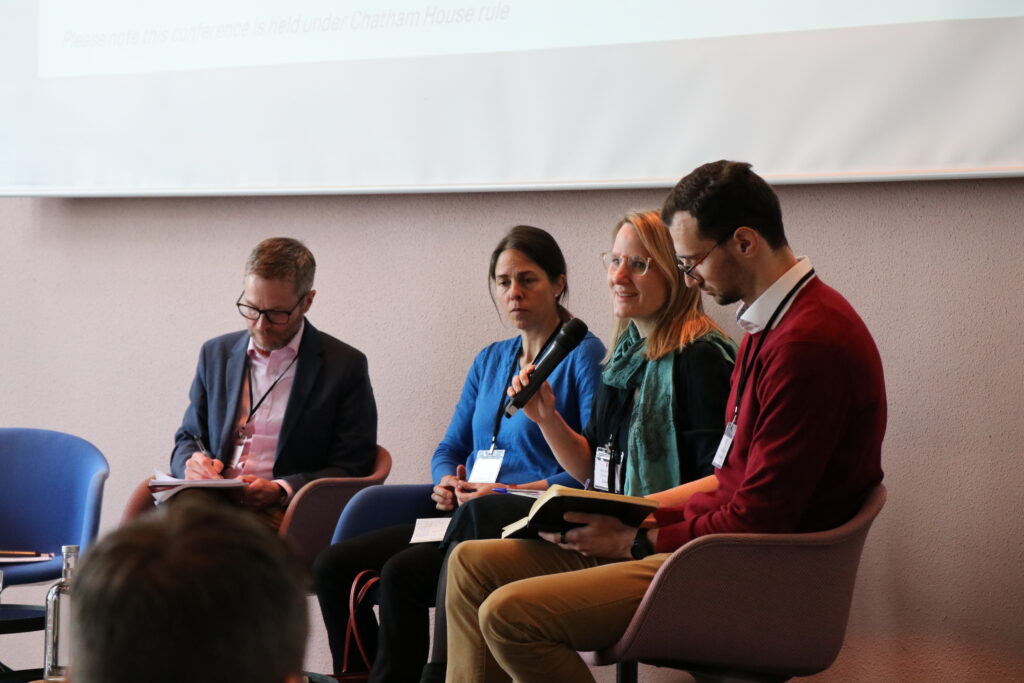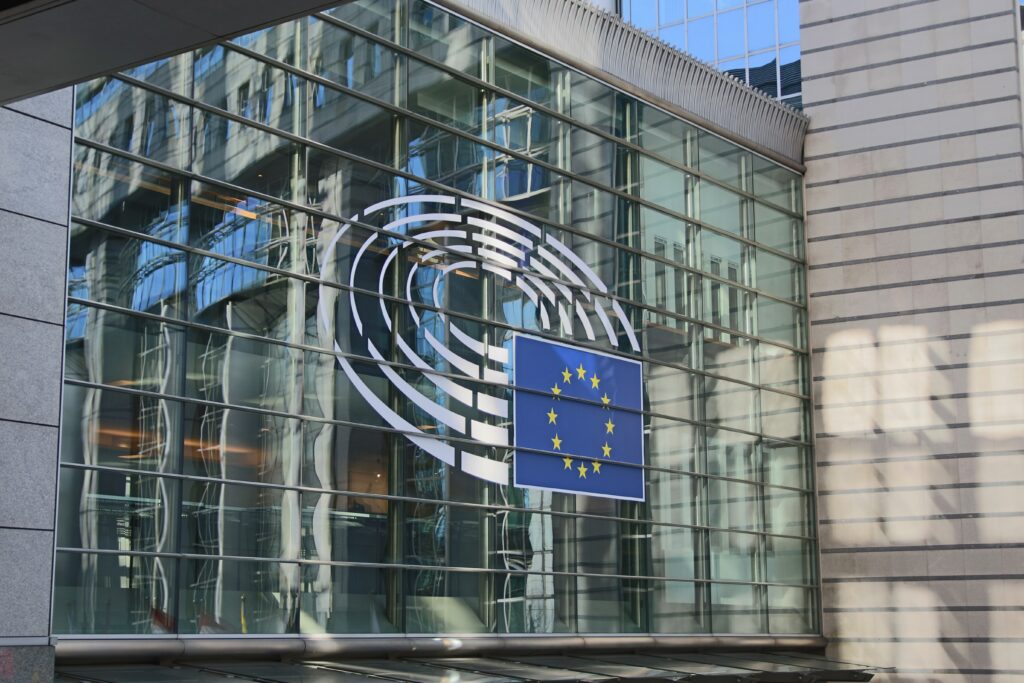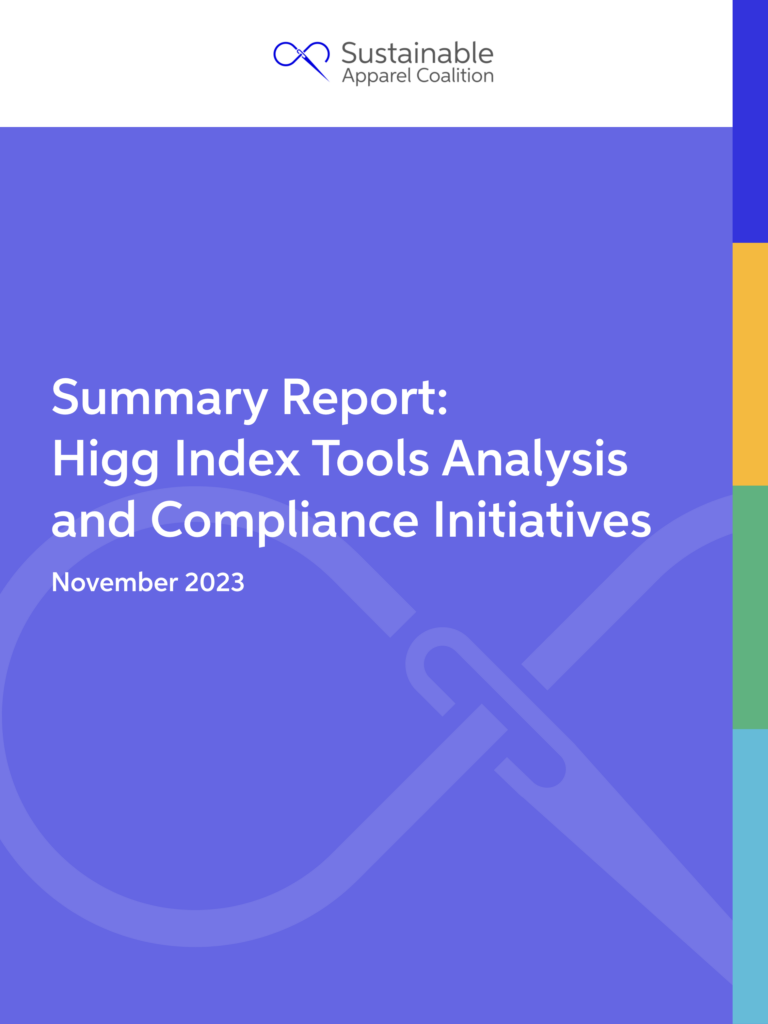
Dear Fashion: Let’s Step Up and Get Aligned
In a recent opinion editorial with WWD, CEO Colin Browne argues fashion needs to take more serious and coordinated action on sustainability. Read the highlights here!
Cascale, formerly the Sustainable Apparel Coalition, and Worldly, the planet’s most comprehensive sustainability data and insights platform, have published a deep dive paper analyzing the European Union’s (EU) Corporate Sustainability Due Diligence Directive (CS3D).

Cascale, formerly the Sustainable Apparel Coalition, and Worldly, the planet’s most comprehensive sustainability data and insights platform, have published a deep dive paper analyzing the European Union’s (EU) Corporate Sustainability Due Diligence Directive (CS3D).
This comprehensive analysis provides a detailed overview of the directive’s implications for businesses, especially within the textile, apparel, footwear, and wider consumer goods sectors.
The CS3D, adopted by the Council of the EU on May 24, 2024, and published in the EU Official Journal on June 13, marks a significant milestone in the EU’s efforts to enhance human rights and environmental due diligence. The directive requires large companies to identify, prevent, and mitigate adverse human rights and environmental impacts associated with their operations, which would set a new international benchmark for responsible business conduct.
Key highlights from the paper:
Businesses, stakeholders, and industry professionals can explore Cascale and Worldly’s deep dive paper to better understand the implications of CS3D on their businesses and how to prepare for its implementation. The paper provides valuable insights to help companies transition towards more responsible and sustainable business practices.
Read the full deep dive paper here.
The adoption of the CS3D is a significant step towards enhancing corporate sustainability and accountability within the EU. With detailed analysis and practical guidance, Cascale and Worldly aim to support Cascale members and Higg Index users in navigating this regulatory change and driving positive social and environmental impacts.

Cascale, formerly the Sustainable Apparel Coalition, has released its second Global Legislative Update to members.
The comprehensive quarterly report provides a detailed overview of legislative activities affecting the textile and apparel industry, as well as the broader consumer goods sector, across the EU, U.S., Asia, and other key markets. As a global nonprofit alliance with over 300 leading organizations, Cascale understands the crucial role of staying informed about policy changes to support sustainable practices and navigate evolving regulations.
Below is a summary offering a sneak peek into Cascale’s Global Legislative Update. The full document is available exclusively to Cascale members through Cascale Connect, a members-only platform. Cascale members can click here to access the full report.
From April to June 2024, significant legislative progress was made in areas such as climate change, labor rights, and promoting a nature-positive future.
Cascale’s Public Affairs team aims to provide members with regular updates and insights regarding key developments and potential effects of relevant legislation, aligning with Cascale’s strategic plan, policy priorities, and members’ greatest needs. Members may access exclusive public affairs and policy resources on Cascale Connect here.
Subscribe to our newsletter for the latest Cascale updates, events, and public affairs activities.
Not yet a Cascale member? Click here to learn more about becoming a member.

Elisabeth von Reitzenstein, senior director of policy and public affairs at Cascale, joined a panel at Innovation Forum earlier this month on how brands can be more reactive to incoming legislation. Moderated by Ian Welsh, publishing director at Innovation Forum, the panel also included Kresse Wesling, co-founder and director of CBE, Elvis & Kresse, and Ilya Kleyner, lead sustainability solutions architect at Altruistiq.
Von Reitzenstein gave an anecdote, noting the progress brands have made over the last 15 years on their public affairs activities. She emphasized the importance of brands stepping up their resources to be proactive, and avoid the potential reputational risk of only taking action when required to comply.
She welcomed a wider collaborative approach, and encouraged brands to be actively involved in policy discussions, sharing knowledge and developing joint industry positions within industry organizations and initiatives such as the Policy Hub. Von Reitzenstein detailed the importance of prioritization of collective action along the supply chain, including transparency to identify and address sustainability issues. She explained the significance behind “Cascale’s” new name, which is “Collective Action at Scale” and reiterated the fact that this collective action had to happen together with manufacturers.
She highlighted the Higg Index suite of tools as an example brands can use to understand and improve their sustainability performance. Cascale is committed to continuously updating the Higg Index tools to meet the needs of its members, users and the broader industry and support them in their compliance journeys and beyond.
This year, Cascale launched a webinar series sharing how the Higg Index tools have been mapped to existing and upcoming legislation, and how it plans to evolve the tools accordingly. The organization has also shared and continues to develop resources for members and Higg Index users to ensure they’re well-informed and supported in their compliance journeys.
In March, Cascale and Worldly held a webinar, “Navigating Legislation & the Higg Index: Higg Product Tools with PEF and more.” In this blog, we share the recording, highlight key takeaways, and address submitted questions during the session.

Key Takeaways
“The PEF methodology is likely to play an important role in the future EU product and consumer law legislation. The Higg Product Tools methodology is well-positioned for alignment with Product Environmental Footprint (PEF)/PEF Category Rules (PEFCR), and the Higg Product Tools can support members in navigating evolving legislations and provide guidance in their compliance journeys.” –Elisabeth von Reitzenstein, senior director of policy and public affairs
“France has been, and probably will be for the foreseeable future, a frontrunner on sustainability legislation….The French label is based on a type of PEF. It has very strong alignment with the European Product Environmental Footprint principles. One difference on durability is that the French Methodology also includes ‘emotional durability’ to a more committed extent than the European one. This proves again that a common method on PEF is important…Another new French initiative is a draft bill targeting fast fashion and sometimes ultra-fast fashion… Also on the European level, France is fighting its corner on these issues. At a Council of the EU meeting on March 25, it called, alongside Sweden and Denmark, for an EU-wide export ban of hazardous textile waste to developing countries.” – Elisabeth von Reitzenstein, senior director of policy and public affairs
“Through our partnership with Cascale, Worldly is paying close attention to this regulatory landscape and what our customers need in order to prepare and report on their sustainability performance and progress. My team meets at minimum weekly with Cascale to get deep into the weeds on PEF, how it’s evolving, and what it means for our tools and the solutions we’re delivering. The Cascale team also helps us understand the challenges the industry is facing firsthand and ways to address it in the tools. Data is going to play a critical role in many, if not all, of these reporting requirements.” – Paula Bernstein, senior data manager, Worldly
“The concept of accessibility is really key for the Product Tools because we want a variety of users with different levels of LCA knowledge, as well as data availability to produce consistent environmental product footprint results.” – Quinten Geleijnse, manager, Higg Product Tools and lifecycle assessments
“Like the rest of the Higg Index Tools, we don’t want the sole purpose of the tools to be compliance – the tools should be going beyond regulation. We’re not just trying to have a PEF-compliant calculator. That is not ambitious enough to get the industry on track to where it needs to be. [The Higg Index] needs to be aligned with PEF, at minimum for compliance, but we do need to go beyond that.” – Joel Mertens, director, Higg Product Tools
“There are a lot of commonalities between Higg Index Product Tools, PEF, and France’s Ademe methodology but we do expect that even with the same product information, it is very likely you will have different results depending on which methodology you’re calculating to or which region you’re calculating to…One of the important things is while there are differences in the results, the impact categories, the data needs, there is a way to bring this all together, and that is the hub concept.” – Mertens
“One of the key aspects here is the difference between a footprint calculation and a footprint study, or LCA study. Our tools are calculating an environmental footprint of a product. An LCA study is distinct from the footprint calculation. There are additional requirements that have to be done to take you to that full study level, including a report and verification.” – Mertens
“PEF is an implementation of ISO-1440 and 44 standards. There are study requirements associated with that that I think get lost in the narrative. As to other tools in this space, the one thing I will say right now is there is not a final PEFCR for apparel and footwear. There are a lot of claims and misunderstandings as to what you can say in terms of compliance to PEF and PEFCR, and there’s no such thing at this point.” – Mertens
Questions Answered
On the webinar, speakers discussed relevant EU legislation and initiatives, including:
These regulations relate in different ways to the Product Environmental Footprint (PEF) method and product footprinting in general. CSRD requires a thorough assessment of an organization’s impacts, risks, and opportunities, and specifically mentions PEF as a way to assess these. In addition, the calculation of scope 3 emissions is required under ESRS E1, for which LCAs and/or PEF studies are useful. ESPR will likely require environmental impacts to be communicated to external stakeholders through the Digital Product Passport, for which PEF and LCA studies can be used. The European Commission proposal for the SGCD sees a more diminished role for PEF in its current form than initially foreseen. Although PEF might not become a mandatory requirement itself under SGCD, the more simplified procedure now pursued may include a presumption of conformity for environmental claims that are based on recognized methods, such as PEF. The French labeling law is based on calculations obtained from a central database run by Ecobalyse and the Agency for Ecological Transition (ADEME). This method is inspired by PEF but has some noticeable differences.
The PEF category rules (PEFCR) contain specific rules for product categories that complement the PEF methodology. The rules direct focus to the parameters relevant to that specific product group, further standardizing the methodology. The Technical Secretariats (TS) of the EU develop these PEFCRs, and Cascale coordinates the TS developing the PEFCR for Apparel & Footwear, which includes determining the product-specific methodology and primary data requirements. The TS does not determine what secondary datasets are to be used and has to stay in line with the general PEF methodology. The PEFCR is expected to be finalized in Q1 of 2025 and is currently in its consultation phase.
The Higg Product Tools aim to guide product eco-design decisions by providing reliable, high-quality data. Given the legislative developments and the changing data requirements that they cause, the Product Tools should evolve accordingly. Our objective is to develop the Product Tools as a hub that allows different users (with different levels of data availability and LCA knowledge) to compute different types of results for different purposes. This means users can continue to identify impact hotspots and calculate scope 3 emissions, while we expand the tools’ functionalities to allow for PEF calculations. It is important to note that PEF compliance entails more than calculations only as PEF requires an extensive study report that has to be verified by a third party.
Some steps towards PEF-aligned calculations have already been taken by Cascale and Worldly. The current Product Module methodology was developed in alignment with the 2021 version of the PEFCR. This means the Product Tools are already well set up to expand towards PEF-aligned calculations. The team has mapped the key remaining differences between the current Product Tools methodology and emerging regulatory frameworks. This exercise informs Cascale’s product information Member Expert Team (MET) that currently helps define the product-relevant information fields the Product Tools need to contain to align with the data requirements of various frameworks, including PEF, ADEME, and the DPP. As indicated by the workstream flow chart below, Cascale will begin integrating the ADEME and PEF calculation methodologies with the Product Tools when they are finalized. In the meantime, work with the Product Information and Product Impact MET and continue to develop the tools’ hub functionality.

Cascale is working with Wordly to create a harmonized set of information fields for the Product Tools, containing all required information from the different legislative frameworks and distinguishing between mandatory, recommended, and optional data points. This allows users to compute different types of results based on a single set of information and enables the provision of at least some results when limited data is available. Cascale will also expand its current list of five impact categories to the 16 impact categories specified in the PEF methodology. To enable different result types to be computed, different calculation methodologies will have to be integrated into the Product Tools, some of which rely on different datasets than those currently used in the tools. Cascale is working together with Wordly to allow for parallel impact calculations and add these new (EF) datasets to the tools.
Please note that the visual is taken from the webinar slide deck and the timeline reflects the March 27, 2024 webinar date. Depending on when you are viewing this blog post, the visual may be out of date.
Cascale and Worldly are working together to expand the Product Tools to enable users to select the energy mix used to manufacture their products. This will ensure the country or facility-specific energy mix is considered in the calculations, providing more precise impact calculations. A next step will be to connect the Higg Product Tools with the Higg Facility Environmental Module (FEM) to enable the sharing of facility data to be used for product impact calculations.
While many of our members can and are already using the product tools for homeware and home textiles, PEF currently is explicit for “Apparel and Footwear.” The sectors the EU Commission has identified for PEF are the following:
However, the Product Tools may still be used to assess adjacent products such as home textiles. Even our current Product Module tool has an option for an “other” product category, which is being used by some members to assess these types of products.
If you have any remaining questions, we invite you to email us at marcomm@cascale.org.


Cascale has released its 2024 Policy Priorities.
Rooted in the organization’s strategic plan, Cascale outlines eight key policy areas of focus aimed at fostering impactful change and driving industry-wide transformation by aligning policymakers and stakeholders toward sustainable solutions.
“As we face mounting environmental and social challenges, collective action is essential to achieve a more sustainable future,” said Elisabeth von Reitzenstein, senior director of public affairs at Cascale. “Through these policy priorities, we call on policymakers to work hand-in-hand with industry stakeholders to create a level playing field and foster innovation that benefits both people and the planet.”
As the world prepares for the impact of key elections in pivotal countries like India, Pakistan, the U.S., the U.K., and within the European Parliament, 2024 presents a unique opportunity to shape policy and influence decision-making. Cascale recognizes the importance of articulating its global policy priorities to policymakers worldwide, aiming to advance a more sustainable consumer goods industry. The policy priorities were developed collaboratively with Cascale’s Public Affairs Strategic Council, which is composed of globally dispersed public affairs specialists from brands, manufacturers, NGOs, and trade associations.
In the face of pressing global challenges such as environmental degradation, social injustice, and economic volatility, Cascale’s strategic plan centers around three foundational impact goals: combating climate change, ensuring decent work for all, and shaping a nature-positive future. Cascale’s 2024 Policy Priorities, which directly stem from its strategic plan and impact goals, include eight identified priorities for global policymakers:
A key message across the eight priorities is the imperative of data-driven solutions and the necessity of fostering collaborative partnerships between policymakers, businesses, and civil society. Cascale champions a balanced approach that acknowledges both the imperative of global standards and the nuances of regional contexts.
On the EU level and in line with Cascale’s collaborative spirit, Cascale partners with the Policy Hub, an initiative that unites the apparel and footwear industry to speak in one voice and propose policies that accelerate circular practices. This collaboration ensures the alignment of policy recommendations and synergy in the organizations’ advocacy efforts. The Policy Hub’s “Policy Recommendations for the 2024-2029 EU Mandate” serves as the EU-specific policy papers for Cascale. Additionally, Cascale is planning further collaborative efforts with its global Public Affairs Strategic Council members to draft region-specific policy recommendations for the Asia-Pacific and U.S. regions.
Collaborating closely with key partners like Worldly, the exclusive platform provider of the Higg Index suite of tools, alongside other external stakeholders and policymakers, Cascale is dedicated to empowering its members to navigate emerging requirements effectively. Together, we’re determined to drive positive, lasting change within the consumer goods industry, forging a path toward a more sustainable and equitable future for all.
On March 27 we hosted the inaugural webinar in this new series on how the Higg Product Tools intersect with key legislation such as Product Environmental Footprint (PEF), Ecodesign for Sustainable Products Regulation (ESPR), and Substantiating Green Claims Directive (SGCD).
The SAC’s senior director, policy and public affairs, Elisabeth Reitzenstein weighs in on the EU’s Corporate Sustainability Due Diligence Directive.


A Gain for Corporate Good
Last week, the European Parliament and the Council of the European Union chose to prioritize social and environmental good by striking a deal on the Corporate Sustainability Due Diligence Directive (CSDDD).
The CSDDD marks a huge leap toward transformative change, setting strong due diligence obligations for large companies in or who sell in the European Union. It will hold large companies accountable regarding actual and potential adverse impacts on human rights and the environment, “with respect to their own operations, those of their subsidiaries, and those carried out by their business partners,” per the news release.
“The SAC has been following regulation closely, so that our members can be prepared and proactive. We believe regulation is essential to drive meaningful change and the agreement reached on CSDDD is a major step forward,” said Elisabeth Reitzenstein, senior director, policy and public affairs.
This EU Directive builds in joint liability to ensure wider supply chain accountability. Importantly, it covers upstream and partial downstream activities, such as distribution or recycling. To note, the financial services sector is excluded from the initial agreement but could see “possible future inclusion.” Currently, the CSDDD applies to companies with over 500 employees and a net worldwide turnover of over €150 million. For non-EU companies, it will apply if they have over €150 million net turnover generated in the EU, three years after it goes into effect. The Commission will publish a list of non-EU companies affected by the Directive. It will not apply to micro companies and SMEs.
In essence, companies must include a transition plan for climate change mitigation and remedy or resolve adverse impacts on the people and planet. Penalties for non-compliance entail fines of five percent of a company’s net turnover. The Directive also makes a stand for “meaningful engagement,” as in dialogue and consultation with affected stakeholders as part of the due diligence process. The regulators also look to reward companies doing good, saying their compliance could open them up for public contracts.
Amid ongoing policy developments, the SAC initiated analyses of the Higg Index tools and their alignment with EU and national legislation, with a specific focus on corporate sustainability due diligence and reporting. Regular updates to the Higg Index tools proactively address the evolving demands of transparency and disclosure mandated by legislation, ensuring that SAC members are well-equipped with the latest resources to meet regulatory requirements.
“The Sustainable Apparel Coalition including our Policy and Public Affairs team is consistently – and meaningfully – involved in addressing the key issues which are critical for advancing sustainability in the textiles and apparel sector,” said Reitzenstein. “Our strong policy focus is shown in our recent collaborative reports and partnerships. We work closely with the Social & Labour Convergence Program (SLCP), the Global Fashion Agenda (GFA) and the Federation of European Sporting Goods (FESI). Additionally, we co-founded the Policy Hub to propose and support ambitious sustainability policies for the textiles industry, particularly in the European Union. However, we not only ensure proactive engagement in policy but also prioritize educating our members on the implications of upcoming measures and legislation, emphasizing how the SAC and the Higg Index tools support members in their compliance journeys.”
In collaboration with partners and stakeholders, the SAC actively engages in pioneering projects, including the development and support of an OECD-aligned Human Rights and Environmental Due Diligence (HREDD) framework. Collaborating with Worldly and Fair Wear, the SAC is working to deliver resources for effective human rights due diligence.
Reitzenstein said the team’s upcoming initiatives include targeted deep-dive analyses for SAC members, providing exclusive insights into legislation versus tools. This includes the recently published Higg Index Tools Analysis and Compliance Initiatives Summary Report with the support of consultant partners. This report maps out the evolving policy landscape including the CSDDD, the European Corporate Sustainability Reporting Directive (CSRD) and more.
“Through these efforts, we show our commitment to helping our members navigate the evolving regulatory landscape in real time,” she added. “We are also developing information materials and organizing webinars to communicate results, fostering knowledge exchange within our community and, to some extent, the wider public.”
Collectively Advancing
“Incentives are the driving force behind transformative change, and the CSDDD exemplifies this commitment. By mandating assessments of environmental and human rights impacts, the CSDDD plays a pivotal role by motivating proactive engagement beyond compliance, promoting transparency, fostering innovation, enhancing competitiveness, and supporting collective efforts toward global sustainability goals.” –Elisabeth Reitzenstein, Senior Director, Policy and Public Affairs


Developed in partnership with the Global Fashion Agenda, the Sustainable Apparel Coalition has developed a Higg Index Tools Analysis and Compliance Initiatives Summary Report, which is now available to the public.
In collaboration with professional consultancies and partners, the SAC initiated analyses of the Higg Index tools in relation to relevant existing and upcoming EU and national (European) legislation. The summary provides key messages and main outcomes of the analysis, along with proposed next steps.
As part of this process, the SAC developed an overview for members explaining how relevant European legislation is applicable to the requirements of the Higg Index tools. It intends to map out the complex and rapidly evolving policy landscape, and support members in their compliance work with their own legal and compliance teams.
The initial analysis considered factors such as corporate sustainability due diligence and corporate sustainability reporting and was intended to assess to what extent the Higg Index tools can assist members in their compliance efforts, where appropriate. The SAC is also collaborating with Worldly, an impact intelligence platform that hosts and supports leading industry solutions including the SAC’s Higg Index tools, to deliver a white paper that comprehensively outlines how brands can use the tools to prepare for compliance with the European Corporate Sustainability Reporting Directive (CSRD), in particular.
Key messages of the summary include:
As the Higg Index tools touch upon many aspects included in the regulatory and reporting obligations, the purpose of the collaborative work is to keep abreast of the latest key regulatory developments. This helps in considering potential refinements to the Higg Index tools in the future. Relevant legislation is constantly changing, and many pieces of legislation have yet to be finalized. Hence, the analysis will be conducted continuously, so the Higg Index tools ceaselessly meet the evolving expectations and needs of members and users.